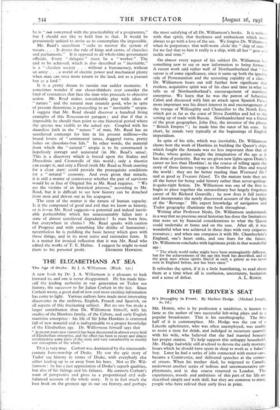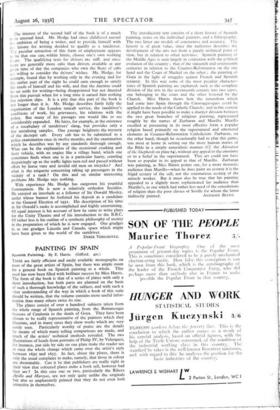FROM THE DRIVER'S SEAT MR. HODGE, who is by profession
a taxidriver, is known to fame as the author of two successful left-wing plays and as a popular broadcaster. This is his autobiography. The first
half of it is commonplace. Mr. Hodge was the son of a Lincoln upholsterer, who was often unemployed, was unable to resist a taste for drink, and indulged in recurrent quarrels
with his wife,, who believed that she had married beneath
her proper stations To help support this unhappy household, Mr. Hodge had while still at school to devote the early morning hours which he should have spent in sleep to work as a baker's boy. Later he had a series of jobs connected with motor-cars, became a Communist,, and delivered speeches at the corners of streets. When his mother died, he migrated to Canada, underwent another series of tedious and unremunerative em- ployments, and in due course returned to London. The experiences, moods and ambitions of this part of his life arc
described simply and with skill, but they are common to many people who have relived their early lives in print.
The interest of the second half of the book is of a much
,re unusual kind. Mr. Hodge had since childhood nursed tfc ambition of being a writer, and to provide himself with th.: leisure for writing decided to qualify as a taxidriver. The peculiar attraction of this form of employment appears to be that one can, within limits, choose one's own working h lars. The qualifying tests for drivers are stiff, and since there are generally more cabs than drivers available at any given time of day the companies who own the fleets of cabs ar,i willing to consider the drivers' wishes. Mr. Hodge, for example, found that by working only in the evening and for the earlier part of the night he could earn enough to satisfy the needs of himself and his wife, and that the daytime could be set aside for writing—being disappointed but not daunted from this pursuit when for a long time it earned him nothing but rejection slips. It is a pity that this part of the book is not longer than it is. Mr. Hodge describes fairly fully the organisation of the London taxicab service, the taxidriver's conditions of work, his grievances, his relations with the police. But many of his passages one would like to see considerably expanded. He hints, for example, at the existence of a vocabulary of taxidrivers' slang, but provides only a few tantalising samples. One passage heightens the mystery of the decrepit cab. Every cab has to be submitted to a police examination once in twelve months, and the examination which he describes was by any standards thorough enough. What can be the explanation of the occasional creaking and fusty vehicle, with an engine like a village band, which one sometimes finds when one is in a particular hurry, crawling despairingly up as the traffic lights turn red and passed without effort by horse vans and invalid old men on tricycles? And what is the etiquette concerning taking up passengers in the vicinity of a rank ? On this and on similar interesting problems Mr. Hodge says nothing.
With experience Mr. Hodge has outgrown his youthful Communism. He is now a relatively orthodox Socialist. He enjoyed an interlude as a follower of Sir Oswald Mosley, under whose banner he forfeited his deposit as a candidate at the General Election of 1931. His description of his time in Sir Oswald's ranks is accomplished and highly entertaining. Of equal interest is his account of how he came to write plays for the Unity Theatre and of his introduction to the B.B.C. Of rather less is his outline of a synthetic philosophy of society in the preparation of which he is now engaged. One grudges it, as one grudges Lincoln and Canada, space which might have been given to the world of the taxidriver.
DEREK VERSCHOYLE.



































 Previous page
Previous page